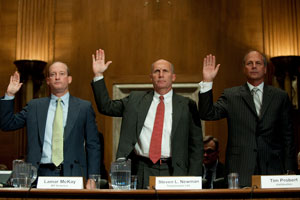The Obama administration has been repeating the line about keeping the “boot on the neck” of BP to force the oil giant to take full responsibility for the Gulf disaster. But perhaps more attention needs to be paid to Deepwater Horizon owner Transocean, which has made several attempts evade liability in the wake of the oil spill. First, the company tried to invoke an obscure, 159-year-old maritime law to minimize the amount of money it might have to pay out resulting from the spill. Then it came to light that the company had transferred $1 billion to shareholders on May 14. Senators are growing concerned that the largest offshore drilling company in the world is quietly trying to shirk responsibility for the ongoing spill.
Eighteen senators, led by Ron Wyden (D-Ore.), sent a letter to Attorney General Eric Holder Monday calling on the Department of Justice to investigate Transocean’s actions in the weeks following the explosion of the oil rig. “We are concerned that such action to quickly move money out of corporate coffers to individual investors may make it more difficult to pursue liability claims against the company,” the senators wrote. “Transocean’s stockholders shouldn’t take huge profits from polluting our country’s Gulf Coast.”
The Washington Post notes that while the plan for the dividend was released three weeks after the spill, the dividend itself had been announced back in February. But the large payout–with the company still under investigation for its role in the spill and the costs of that spill still mounting—has clearly drawn unwanted attention. Transocean’s level of responsibility in the explosion and subsequent collapse of the rig is still not clear. At congressional hearings so far, the three main companies responsible for the rig and well have fingered each other as the guilty party.
Lawmakers say that the actions of Transocean point to the need to raise the liability cap on oil spills and ensure that those responsible –whether that’s BP, Transocean, Halliburton, or some combination of the three—pay up.
Thomas Perrelli, an associate attorney general in the Department of Justice, told a Senate panel Tuesday that they have already informed Transocean that its invocation of Limitation of Shipowner’s Liability Act of 1851, best know for its use by the owners of the Titanic, “is inappropriate.” He declined to comment on any current or pending investigations the DOJ may be conducting on Transocean.
Senators, though, want blood. “This company is working pretty hard to insulate itself from being held responsible,” Wyden said Tuesday.
The DOJ also issued a separate letter to senators Tuesday responding to a request that the attorney general look into whether BP made false claims about its ability to respond to a disaster. In the letter, the DOJ assured senators that they are “examining the full range of affirmative legal options that may be available to the United States” in dealing with the companies at fault in the Gulf. Ronald Weich, an assistant attorney general, wrote that the DOJ has issued formal demands to BP, Transocean and other companies to “ensure the preservation of potentially relevant information” and has outlined the “legal requirements for preserving evidence in anticipation of litigation.”














